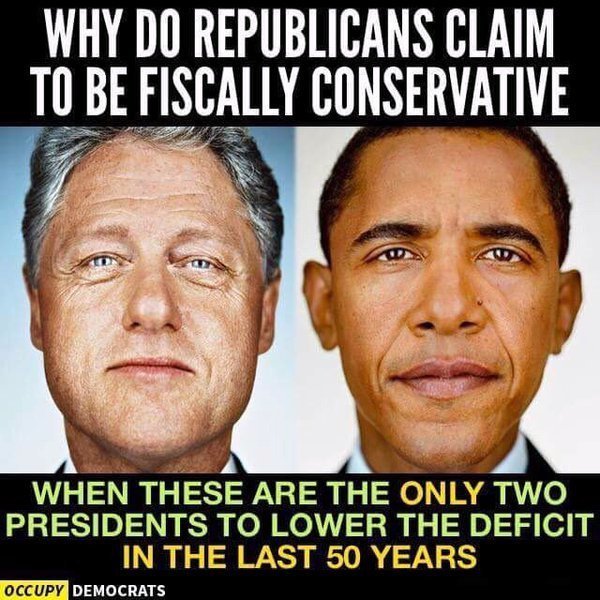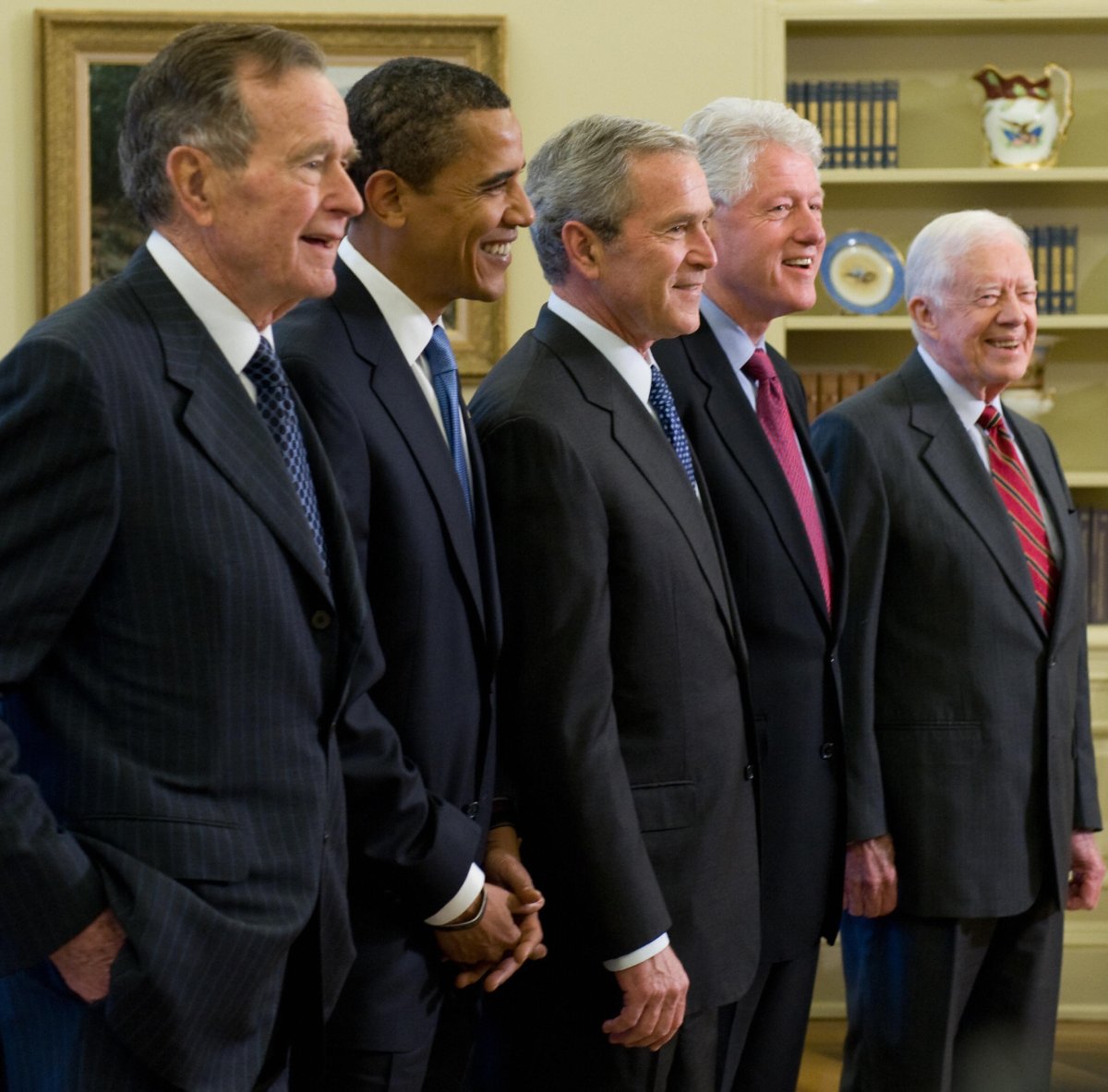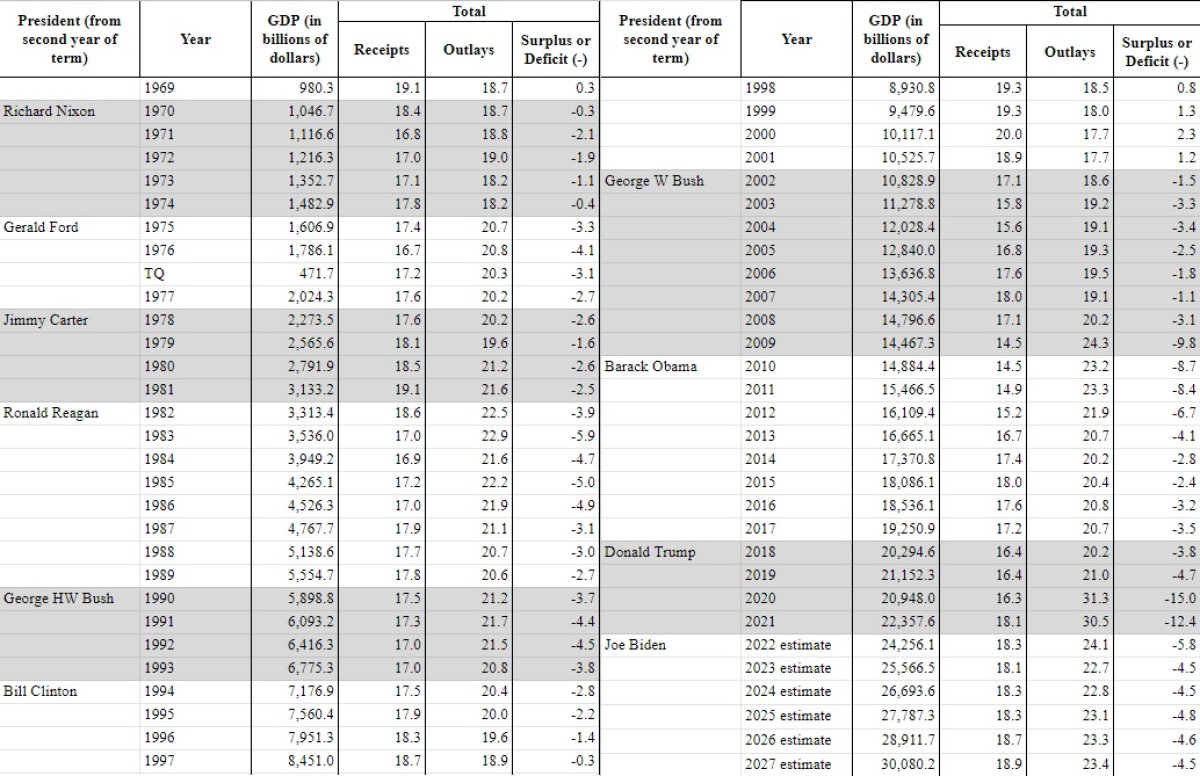A meme shared by and credited to Occupy Democrats, a left-wing political movement, targets "fiscal conservatives," suggesting that Bill Clinton, Barack Obama and Joe Biden are the only U.S. presidents in the past 50 years to reduce the budget deficit.
The Claim
"Why do Republicans claim to be fiscally conservative, when these are the only three presidents to lower deficit in the past 50 years," the caption on the image, featuring Clinton, Obama and Biden, states.
The photo received more that 22,000 interactions on the Occupy Democrats Facebook page, and was shared extensively on this and other platforms, including Twitter.
WOKE WEDNESDAY🥳
— Mikhail&Shenni 🇺🇦 🐬🐶🙏Resist🌊 🇨🇦 🇺🇸 #FB🌐 (@Blueliberals) March 30, 2022
🙏 for 🇺🇦
Meet 🆒🆕🌊
Save 🇨🇦🇺🇸 &🌍democracies#Resistance#VoteBlue2022#NeverForgetJanuary6th #BidenHarris
NO LISTS
Vet/🐾🔙🆒🆕FRIENDS🔜
Truth &⚖️, Facts, Education, 🌳♻️MATTER
Vote☑️
Be Kind to🐶Animals/each other💕
Have fun🥂 pic.twitter.com/aWIxLsVLw0
— Craig Williams (@VoterRooter) March 29, 2022
Similar claims have been made on the back of the Biden administration's latest budget being published, including that "democrats always come in to clean up the Republicans' mess."

The viral image appears to be an updated version of another meme from the early days of the Trump administration, which made a similar claim but featured only Clinton and Obama, and which can be traced back as far as April 2016.

The Facts
A budget deficit occurs when expenses exceed revenue and indicate the financial health of a country. Revenues tend to be sourced from federal income taxes, while the expenses go towards federal funding and government benefits.
When a government records a deficit, it borrows money to plug the gap between income and expenditure. This borrowing forms the national debt, and as deficits accrue over a period of time the debt accumulates.
On the surface, the original claim appears to be accurate—if run against the federal budget deficit as recorded over the past 50 years, which is tracked by the Office of Management and Budget.
During President Richard Nixon's unfinished 8-year term the budget went from a $3.2 billion surplus to a $6.1 billion deficit. The deficit increased further to $53.7 billion under President Gerald Ford, and to $78.9 billion under President Jimmy Carter.
The gap continued to widen under the next two Republican administrations, with President Ronald Reagan racking up a deficit of $152.6 billion in his eight-year tenure, nearly double of his baseline figure, and President George H.W. Bush adding a further $100 billion in his four years.
President Bill Clinton was indeed the first—and only—president in recent history to reduce the total deficit during his time in office, recording a $128.2 billion budget surplus as he left in 2001.
After President George W. Bush took over, the budget deficit skyrocketed more than tenfold, leaving office with $1.41 trillion dollars in the red. President Barack Obama brought that down to a more manageable $665 billion, before President Donald Trump widened it by nearly 2 trillion to $2.77 trillion in 2021.

Factoring In Growth
Under these estimates, the claim that only Clinton and Obama were able to reduce the deficit would be accurate. But there are a number of caveats to consider when addressing such a complex issue.
Firstly, all presidents to a smaller or greater extent inherit—and are constrained by—policies (and policy effects) of their predecessors, such as tax cuts or recessions. Some also have to deal with "black swan" events, such as financial crises or natural disasters, which tend to balloon the deficit.

"The timing point is more down to luck than the effect of legislation," Michael Pearce, senior US economist at Capital Economics, told Newsweek. "Obama and Biden took power as the budgetary impact of the global financial crisis and the pandemic respectively were fading."
Another major issue is that while different administrations construct the annual budgets, it is constitutionally Congress' responsibility to control the country's spending. The president also does not have control over the mandatory budget, such as social security and medicare benefits.
"The constitution gives Congress—not the Executive—the power of the purse," Pearce said. "That's pretty relevant to the original claim too—e.g. for most of Clinton's time in power, Republicans controlled Congress, and for most of Obama's presidency, Congress was split, so any claims of fiscal responsibility have to be judged in light of the checks on their party's ability to dictate spending and taxation."
As Pearce points out, the U.S. has almost continuously run a deficit, so a fairer way to look at the deficit is as a share of GDP. Additionally, as a way of reducing the issue of "inherited spending," given that the federal government's fiscal year runs from October 1 through September 30, it is reasonable to discount each president's first year in office.
Pricing these caveats into the equation paints a somewhat different picture with regards to the "fiscal conservatism"—or fiscal responsibility—claim.
A look at the Historical Tables for the U.S. federal budget shows that only one presidential term saw a consistent budget surplus over the aforementioned period: Bill Clinton's second term, with respective surpluses of 0.8 percent, 1.3 percent, 2.3 percent and 1.2 percent recorded between 1998 and 2001.
But several presidents ended up with a smaller deficit as a percentage of GDP than that with which their second year began.
Those include presidents Ford (from -3.3 percent in 1975 to -2.7 percent in 1977), Carter (-2.6 percent in 1978 to -2.5 percent in 1981), Reagan (from -3.9 percent in 1982 to -2.7 percent in 1989), Clinton (from -2.8 percent to 1.2 percent surplus in 2001) and Obama (from -8.7 percent in 2010 to -3.5 percent in 2017). And during almost all presidential terms the deficit dropped over at least one year.

That would undermine the first part of the claim because it demonstrates that in relation to growth (a key element of fiscal responsibility), several U.S. leaders oversaw a reduction of the deficit.
What About Biden?
The third part of the meme that needs to be assessed separately is whether the Biden administration budget belongs on the list.
It is true that Biden's projected budget has the deficit fall from the -5.8 percent expected in 2022 (which itself is a big drop from the -12.4 percent recorded in the pandemic-hit 2021), to -4.8 percent in 2025, the last year of his first term. It is further projected to drop to -4.5 percent by 2027.
But as economists point out, these figures are at best aspirational, as they are subject to change and additional spending necessitated by unforeseen circumstances.
"The Biden administration's projected budget counts for next to nothing, because Congress will draw up its own budget," Pearce explains, adding that, even as we speak, the ruling party is trying to pass legislation that will significantly impact those projections.
This makes Biden's addition to the list of presidents who reduced the deficit premature, at the very least, and potentially misleading if and when the real budget changes through his first, and potentially second, term.
Newsweek has reached out to Occupy Democrats for confirmation of the meme's origin, and comment on the underlying claims.
The Ruling

Mostly False.
There is an element of truth to the claim that Obama and Clinton indeed achieved deficit reduction during their respective tenures as president. But the question of fiscal responsibility has to factor in growth rates, and when the deficit figures are linked to the GDP, the result shows several other presidents over the past 50 years did so too. Additionally, while Biden's planned budget could add him to that crowd on paper, it is simply a projection that is subject to changes from Congress and unforeseen off-budget expenses. We therefore rate the claim as mostly false.
FACT CHECK BY NEWSWEEK
Uncommon Knowledge
Newsweek is committed to challenging conventional wisdom and finding connections in the search for common ground.
Newsweek is committed to challenging conventional wisdom and finding connections in the search for common ground.
About the writer
Yevgeny Kuklychev is Newsweek's London-based Senior Editor for Russia, Ukraine and Eastern Europe. He previously headed Newsweek's Misinformation Watch and ... Read more
To read how Newsweek uses AI as a newsroom tool, Click here.








